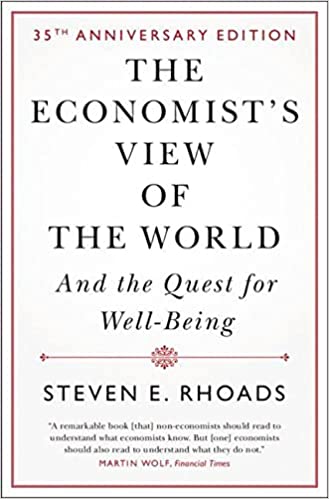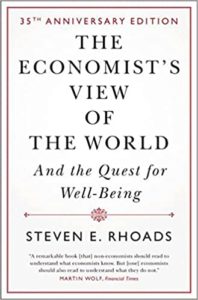

One issue that I didn’t have room to cover in “A Wide-Ranging Book for Non-Economists and Economists,” Regulation, Spring 2022, my review of Steven E. Rhoads’s excellent book The Economist’s View of the World, is the issue of unemployed men.
Rhoads points out that various government welfare programs discourage work by men. He also adds another factor:
But, for most jobless men, it is help from parents, grandparents, partners, and friends that provides the most significant income enabling them to be listless about seeking employment. (p. 122)
Rhoads doesn’t give evidence to back this assertion but, given how careful he is with data in the rest of the book, I assume that he has evidence to back this claim. The big surprise for me in that sentence is “most.” I had no idea that the personal voluntary gifts from friends and loved ones were so substantial.
That puts a new light on the issue. It makes sense to oppose transfer programs that take money from some and give to others in ways that discourage employment. It also makes sense for people who want the men in their lives to have jobs not to keep giving them money. But one is an issue of government policy; the second is an issue of personal policy. To the extent the unemployment of jobless men comes about as a result of voluntary contributions, I worry less. Not that I don’t worry, but I worry less. The reason is two-fold: (1) people aren’t being coerced to help them, or, more exactly, that’s not the main source of funds, and (2) loved ones who want men in their lives to have jobs can decide on their own to help them less or to make their help conditional on the man getting a job.

READER COMMENTS
TMC
Apr 8 2022 at 9:20am
I don’t have numbers to back this up, but I’d guess ‘most’ is there because government help for men who are not disabled is rare. Most goes to women and children. (As it should be in my opinion)
steve
Apr 12 2022 at 5:44pm
This is true except for disability. Almost impossible in many states to get Medicaid or much of any welfare support if you are an unemployed single male. Disability is an exception.
Steve
Ike Coffman
Apr 8 2022 at 2:31pm
My son has a mental illness significant enough that he cannot fit into society, yet not severe enough to be able to receive disability. The hurdles are significant, particularly for someone who rejects all medical care and assistance. Yes, I support him financially, but I feel like I have no other choice. He has been homeless on several occasions, but instead of turning him into a productive worker all that experience has done is made him even more anti-social.
What does economic social theory say about someone who fervently and desperately wants to buy a gun in order to defend himself against people who look at him funny?
Mark Barbieri
Apr 8 2022 at 3:36pm
I’d be interested to see his stats and whether they include men attending school. I have two male children. One is underemployed and the other unemployed and both are living off of money from my wife and I, but that is because they are full-time students.
I recall reading somewhere that a high level of unemployed and unmarried adult males in a society is a high risk factor for a nation starting wars. I don’t recall seeing any data to back up the claim.
Fred Anderson
Apr 11 2022 at 12:51pm
Mark Barbieri;
I believe discussions about “high level of unemployed and unmarried adult males in a society is a high risk factor for a nation starting wars” have been common conjecture concerning the effects of China’s one-child policy.
Chinese parents prefer sons, since the son is expected to help his parents in their old age. (Daughters become part of their husband’s family.) Courtesy of selective abortions and some female infanticide, a significant number of Chinese parents managed to engineer that their one child would be a boy.
That’s a problem twenty years later when we have all these young men and no women for them to marry. If memory serves correctly (and at my age, that’s a big if) the problem got some discussion as “the missing million girls”.
And the speculation was that the Chinese government might solve this problem by handing the surplus young men a rifle and sending them off to conquer somebody. (Actually, if you’re hoping to lose a million of them, you probably have to send 10 million into battle.)
Floccina
Apr 11 2022 at 2:42pm
I seen people contend that non-government charity is too small and so we need forced Government Charity, but think that most charity is not reported but is helping an adult relative or friend, so it may iin-fact be big enough. Steven E. Rhoads’s observation is evidence that I might be right.
And when a friend or relative does it, it’s a plus that it often comes with an admonishment to get to work.
Comments are closed.